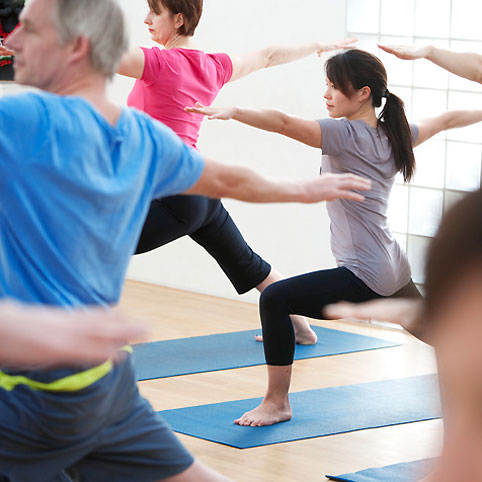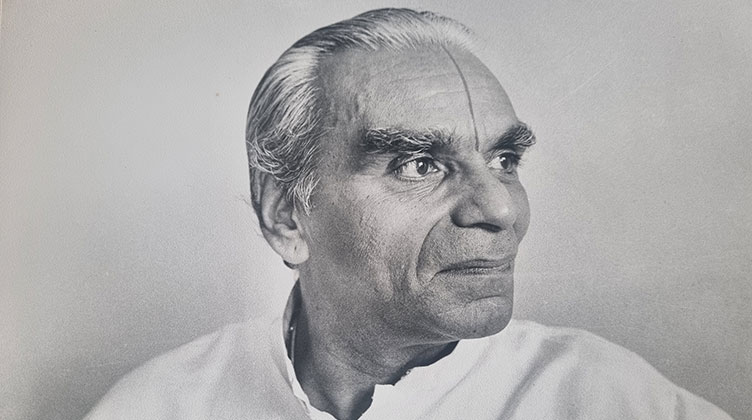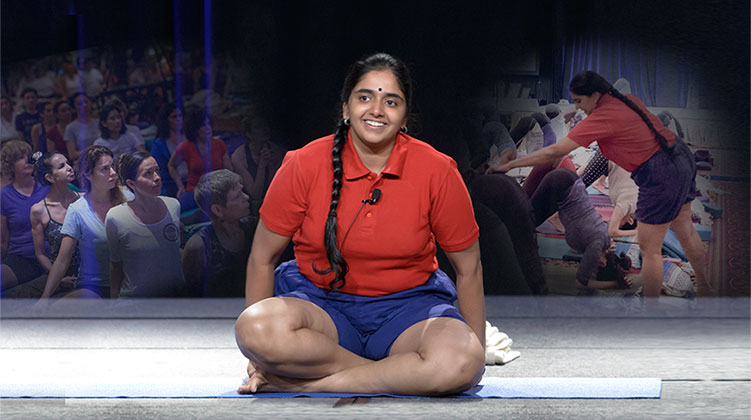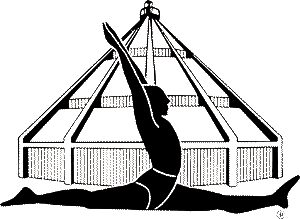
Judi Sweeting is a Senior Iyengar yoga teacher and runs the Cotswold Iyengar yoga Centre in Cirencester. Here she recounts her experience of the menopause followed by the accounts of two other longstanding practitioners. These stories show how the experience of menopause varies from woman to woman and how Iyengar yoga played an important part during this important transition in their lives.
I remember asking my Mum if she could remember when it started for her, when it finished and what it was like? Like most Mums, she couldn’t remember and said it was no problem. But why did I used to find her sitting on the garden steps with her head between her legs? I decided that rather than just giving you my menopause story here, I would add stories from two other Iyengar yoga practitioners and fellow teachers to describe the various stages of their perimenopause, menopause and post-menopausal journey.
No more practising in the corner
I am now 65 years old and no longer squeamish about admitting to it, even though I have a husband who is 10 years younger than me. My menopause started what I was about 53. The perimenopause was pretty uneventful apart from premenstrual mood swings and menstruation that became irregular, very heavy flow and each period ‘was going to be my last’. I remember joining the ‘side ward’ in Geetaji’s class in Pune where menstruating women perform a separate set of poses. After I had been there for 10 days or so, Geetaji came to me, looked quizzical and said ‘still’? I said ‘I’m afraid so, but I suspect this may be the menopause’. Geetaji nodded sagely and said ‘ahh’ and told me to join the main class. It was just what I needed and that was my last period ever!
A surprising surge in ability
The most unpleasant symptom I suffered from was panic attacks, usually in the middle of the night, when I would leap up out of bed and say, ‘I’ve got to go, I’ve got to get out!’ The response from my endlessly patient husband was, ‘Where to?’ This did occasionally happen when I was in the supermarket, jolly inconvenient with a trolley full of shopping. It was a sort of claustrophobia, I suppose. It did pass, it was ‘an inappropriate surge of adrenaline’ while my hormones were sorting themselves out. The most helpful first aid asana was Viparita Karani, very good for the palpitations that bugged me later on. I didn’t get horrendous night sweats or too many hot flushes so I was very fortunate. I was studying for my Senior teaching assessments with Jeanne Maslen, a Senior teacher in Manchester, during the early part of the menopause and I seriously believe it kept me sane. My physical body experienced a surprising surge of ability.
Post-menopausal practice essentials
Now, in this post-menopausal stage, I suffer from stiffness in my groins and hips so I make sure I start my practice with Supta Baddhakonasana without props to get my tailbone lengthening and my groins open, lots of Supta Padangusthasana (all stages), and inverted asanas to make sure that whatever organs I have left stay in place! I am also keeping an eye on my dorsal spine which would like to develop into a hump.
Practice like an 18 year old
The post-menopause is when you learn ‘maturity in practice’. Geetaji has provided us with so much information and help on the problems women may experience and I have followed her suggestions all the way. Those of us who practise Iyengar yoga are so fortunate because it helps us constructively through whatever we are experiencing, it never lets us down. I make sure that once a week I still practice ‘something womanly’. In the absence of periods I feel I need this! I do remember Geetaji telling us that postmenopausal women need to practice like 18 year olds, rather more quickly, vibrantly.
When I have any ailment, my first thought is to do my research and use yoga practice to sort it out and it does, apart from certain infections when antibiotics may be required from time to time. My students come to me with various problems and when I say, ‘Oh, I’ve had that’ they reply, ‘You’ve had everything!’ And I say, ‘Yes, at my age I suppose I have, but I am still practising and teaching Iyengar yoga when most women in my peer group have retired.’
I am now part of what they call ‘the sandwich generation: I am a grandmother to identical twin girls of four and a little boy of eighteen months in an active role and enjoying it very much. Both my parents are still alive, aged 88 years and still living in their own home and coping with macular degeneration, emphysema and arthritis. Sometimes I find it overwhelming, but as people are now surviving until very ripe old age, this will happen more and more. I am so glad to be an Iyengar yoga practitioner with the example of Guruji, a genius, Geetaji, an inspiration to all women and Prashantji, a philosopher – all this in our lifetime, we shall never see the like of this family again.
Judith’s story
Tropical moments
For me the menopause is synonymous with hot flushes. I first began to feel a deep heat rising up from my chest, my face flushing red and then bursting out all over with tropical dampness when I was around 47. At its worst, the symptoms would occur many times a day and at night I would wake up three or four times to stick a leg and arm out of the covers or throw them back completely, even in winter. A visit to the cinema would require wearing a jumper with a zipped front so I could easily adjust my temperature either with the garment slipped off my shoulders or zipped up to the chin. Even now, 11 years later, I have a tropical moment every morning when I wake up.
Yoga poses which most stimulated hot flushes were forward bends. I tended to ignore the symptoms as much as possible, take a few moments to recover, mop my brow and then carry on. Lifting my chest to sit up for the Invocation brought on an immediate hot flush and so, when practising pranayama, I had to find out which aggravated and which soothed and how to breathe without increasing heat. Lying down was often better. Resting poses were beneficial, especially after a disturbed night’s sleep. The menopause is definitely a time when energy levels are depleted. Nowadays I seem to have the reverse symptoms feeling cold when others are wanting to open the windows!
My main persistent problem was tendonitis in my knees and shoulders as the ligaments or tendons seemed to become more vulnerable to damage. Fortunately they weren’t all problematic at the same time but I always seemed to have some swelling in one knee or pain in one shoulder and then it would be the opposite one. This did affect flexion of the joints which made props absolutely necessary for certain postures like Supta Virasana. Each problem took about 2 years to recover from and I worked through the symptoms with yoga. I never went for a MRI scan or received medical treatment. I did once consult my doctor about a painful shoulder and was told that it was probably arthritis and was prescribed anti-inflammatory arthritis tablets. I threw the prescription away as the possible side effects of the drug were so alarming – just as well as ‘arthritis’ was not actually the problem and my joints feel much better now, although I do have to take care of them.
There were some other symptoms which affected me now and again. I had migraines for the first time during my menopause but fortunately these stopped soon afterwards. In the early years of my menopause I had some symptoms of Irritable Bowel Syndrome and anxiety. My anxiety was eased with chamomile tea, pranayama and asanas such as Adho Mukha Svanasana in the rope with head support, Prasarita Padottanasana, Supta Baddha Konasana over a crosswise bolster with head support, Viparita Karani, Halasana with feet apart and supported above hip height and cutting out caffeine.
Lighter and mellower
Now I’ve come out the other end of the menopause tunnel I have more energy again, but I don’t have as much stamina and so I pace myself. Extra weight which slipped on slowly and almost imperceptibly over several years, which used to be called, middle aged spread, is now more under control. Despite being older and ‘past my prime’, I have a great feeling of liberation and consolidation and I sense a mellower time ahead.
Ronnie’s story
I’m 62 years old and had 3 children in my early 30’s and have been married for 39 years. I started practising yoga in 1969, attended my first Iyengar class in Cambridge in 1976 and have been practising Iyengar yoga ever since. I started teaching Iyengar yoga in 1995.
An individual experience
Information abounds about the menopause – clinical, scientific, and anecdotal – but don’t think you have to suffer everything you read or hear about. Each person’s experience of the menopause is very individual. Genes, health, and lifestyle factors all play a part and you have to deal personally with whatever symptoms and issues arise for you. Perhaps the most daunting aspect is the timing. Just as your job is at its most demanding, your children are teenagers or just leaving home, maybe new grandchildren arriving, your parents are aging – all these demands compound the effects of the menopause.
I had a relatively uneventful menopause in my early 50’s. My periods had been very heavy for a few years; then they stopped for a year, only for one to return coinciding with my Intermediate Level II teacher training assessment and my father-in-law dying – see what I mean about outside events and timing!
Regular practice & the BBC World Service
I had no hot flushes, no night sweats. I had a couple of panic attacks and a few years of sleepless nights. The World Service is excellent for these! I never felt the need to do any specific yoga practice, I just carried on as normal and have no doubt that my lifetime of consistent yoga practice regularised my hormonal balance in some way. Also I had a full osteoporosis scan a few years ago and was told I had the bone density of a person 20 years younger than my age.
Lighter and liberated
Life is great post-menopause. Again, don’t believe everything you read and hear. For one thing, I’m two stone lighter and I feel liberated in many ways, however I do miss my enforced menstruation practice. You do have to remind yourself to pace yourself occasionally as you’re not as young (chronologically) as you were!
Yoga and Menopause: Dipika, Journal of Iyengar Yoga London, vol.42 (2010)
Blog categories
Become a member
Join our community to get reduced class prices, early booking for events and workshops plus access to the studio for self practice.
Recent news and articles
Iyengar Yoga Home Practice Videos with Raya Uma Datta
27 March 2025|
B.K.S. Iyengar’s visits to Ann Arbor, Michigan
20 March 2025|
Origins of the Modern Yoga Mat
24 October 2024|











